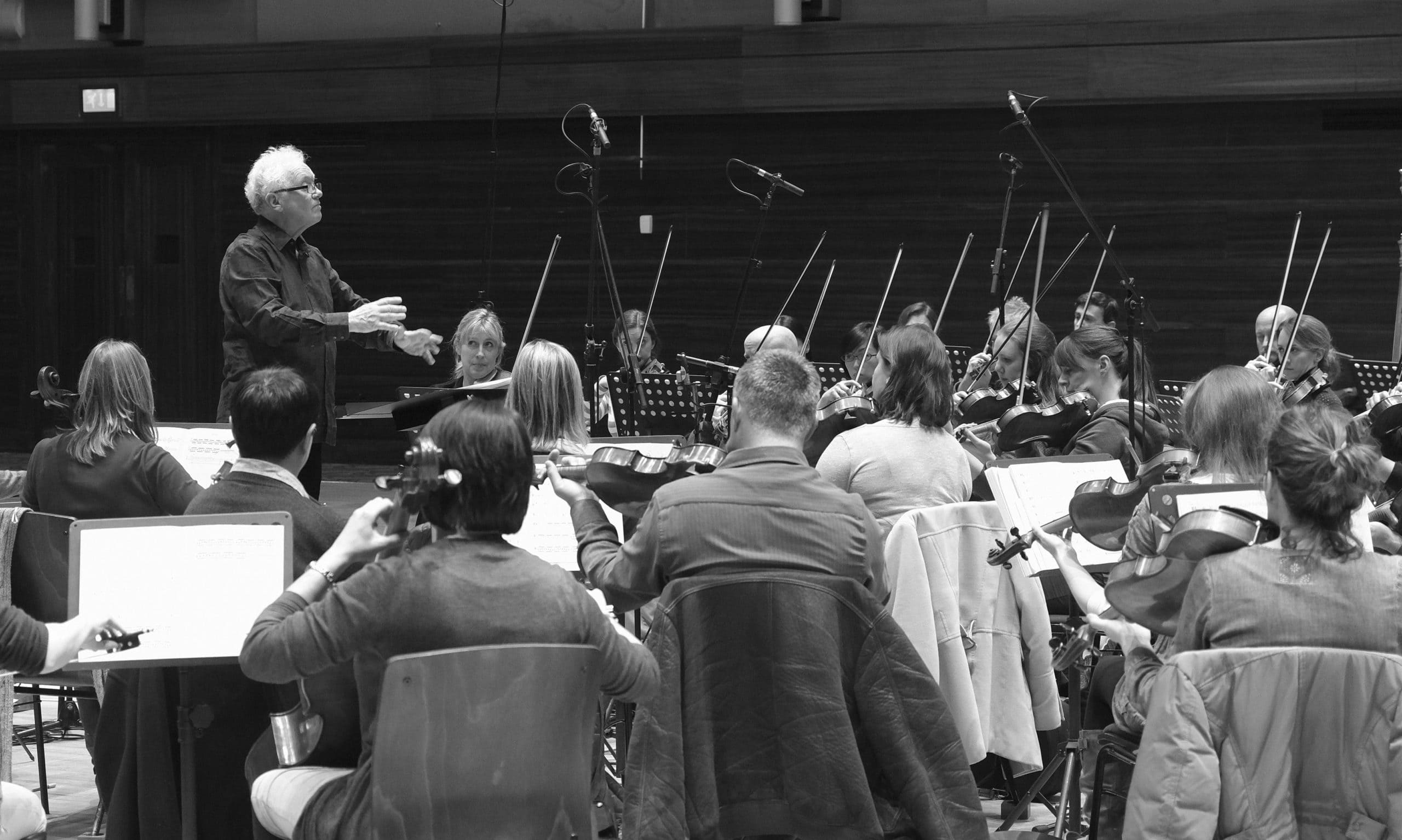Christopher Gunning is famously known for his work in film and TV, most notably the iconic signature theme for Agatha Christie’s Poirot and evocative music for Olivier Dahan’s La Vie En Rose. More recently however, a culmination of 16 years of contemporary classical music composition has led to a shift from a career in media to one of significance in the concert area.
Who gave you your first big break and opportunity at the start of your professional composing career, and what was it?
I was asked to write the score for a documentary film called “Run Away to Sea’” The film was shot aboard the P & O’s SS Canberra and showed the onboard activities one should find when taking a cruise. The film was used as a colour test film on BBC2, so was broadcast several times each day. This was terrific for me, because it earned quite a lot of royalties, at a time I was totally broke! It also paved the way for more film commissions, as well as advertising commercials and so on. Around the same time I assisted Dudley Moore, who was writing the score for “30 is a Dangerous Age Cynthia” – I learned so much from this practical experience and it was so enjoyable! Richard Rodney Bennett, my former teacher, also asked me to help out with the music for “Nicholas and Alexandra,” which was another wonderful experience.
You’ve achieved great success and are highly respected in both writing to screen and composing large scale concert music. How do you establish yourself in both fields and how do you effectively manoeuvre between the two?
In my early twenties, having recently emerged from 4 years at music college, it was imperative that I earn a living somehow. There are two main methods of surviving as a composer; 1) by teaching or 2) by working in the media. I chose the latter, and forged a career by composing music for TV commercials. That meant fixing meetings with the creative departments at all the advertising agencies in London and trying to convince producers that I was the man to write their music. It was slow at first, but little by little I was commissioned to write some commercials and after a couple of years the phone was ringing quite frequently. Some ran for a long time – Martini, Black Magic, and Lloyds Bank are examples. Simultaneously I was being asked to arrange the backings for various pop singers of the day; Shirley Bassey, Cilla Black, and Colin Blunstone come to mind, and eventually I was offered the chance of doing an album with Mel Torme, which was fantastic! Gradually my film and TV commissions became more plentiful, and I did a few Hammer Films, as well as Under Suspicion, Firelight, and La Vie en Rose, starring Marion Cotillard as Edith Piaf. One of my biggest commissions was for the TV series “Agatha Christie’s Poirot.” But all the time I hankered after a different kind of musical life, and about 15 years ago I realised I had to make some drastic changes. I steadily stopped working on films, commercials and the rest, and applied myself to a Saxophone Concerto. Then followed a succession of symphonies, and I have just finished no.13. Progress has been frustratingly slow sometimes, but most are now recorded, the most recent being a CD of symphonies 2, 10 and 12. A number of concertos have also been composed, and most of these, too, have been recorded. I have had to be patient – it takes ages for music lovers and musicians to realise that this is now the nature of my career. General critical response has been very encouraging, but I’m still waiting for a performance of my work by one of the top London orchestras.
In 1992 you won Best Film Theme or Song at The Ivors for Under Suspicion, and again in 1997 for Best Original Music for a Broadcast as well as 1999 for Best Original Film Score, Firelight. What did winning Ivor Novello Award mean to you?
The great thing about winning an Ivor is that they are awarded by your peers. They are thus refreshingly free of commercial considerations. There’s nothing better than your friends and colleagues saying “well done, Christopher.”
How do you land your dream film, TV or ad commission?
The only reasonably sure fire way of landing your dream commission is to produce a catalogue of excellent work. So often one is considered for a job on the basis of past scores the producer and director noticed and liked. It probably helps for it to become known that you are a reasonable person to work with too!
The iconic score you wrote for the Martini ads in the 60s and 70s has been arranged in a number of ways over at least a decade. But other composers have laid claim to it. How and why?
I don’t honestly know. I did all the arrangements for a lengthy period, but under the terms of the contract the advertising agency was also free to engage others to arrange my tune. So long as any resulting arrangements were properly notified to PRS and MCPS I was not unhappy with this, but it has to be said that not all composers and arrangers were as scrupulously honest as I am…
Which living instrumentalist or ensemble would you still like to write for and why?
I would like to be commissioned by a leading orchestra, either here in the UK or abroad, to write a new orchestral work. I am also interested to write some choral music, either of a religious nature or not. I am talking to Simon Desbruslais about a new trumpet concerto, and Harriet Mackenzie about another Violin Concerto. But we have to find finance for both of these, and that’s an ever-present issue.
Which film franchise project would you want to write the signature themes for and why?
My main focus now is to compose “concert” music, but I have asked myself whether there is a film project I would like to apply myself to. Maybe if somebody was to approach me to work on a nature film, or something with a strong ecological theme, I could be persuaded?
The Ivors Academy have spoken out openly about the negative impact music buyouts have on the livelihoods of screen composers. What in your view needs to be done to improve the situation and protect creator’s rights?
I cannot agree to buyouts! How is a composer to survive if one of his/her principle sources of income is taken away? It is imperative that composers of all genres stick together and fight the huge commercial interests behind buyouts.
What advice can you give to young composers starting out?
Never lose sight of the dream that made you want to be involved in music in the first place! And if you harbour designs on writing symphonies or other orchestral pieces, don’t hang about – get on and do it! Also – don’t be snobbish about writing commercial music – there’s a need for it and if nothing else it will help keep you fed!





